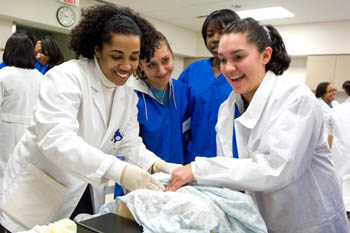 |
Medical Students Find Rewards in Mentoring High School Girls
Fourteen Feinberg School of Medicine students recently found that giving up their rare time off to mentor young women considering careers in medicine really had nothing to do with giving up at all. Turns out, they were the ones on the receiving end.
The medical students mentored 16 high school seniors from the science-focused Young Women’s Leadership Charter School of Chicago as part of a 3-week lab project. Called the Center for Reproductive Science (CRS) University/Oncofertility Saturday Academy (OSA), the Northwestern program was developed in partnership with the Oncofertility Consortium, (the medical field of oncofertility explores ways to ensure the fertility of girls and women with cancer); the Office of Science, Technology, Engineering, and Mathematics Education Partnerships (OSEP); the Institute for Women’s Health Research; and the University’s CRS.
The teenagers donned blue surgical scrubs to learn about research and the laboratory from scientists, met with surgeons to practice suturing and observe a cancer surgery, and joined with Feinberg School students to gain insight into being a medical student and doctor.
“We taught the senior girls how to listen to our hearts and how to take our pulse and blood pressure,” said second-year medical student Meghan A. O’Halloran of Evanston, Illinois. The teens also learned how to perform a pelvic and Pap smear exam with the use of simulators and models.
“For us it was wonderful because we enjoyed having the close involvement with the girls,” said O’Halloran. “It was clear we all wanted to be there. It was an opportunity for them to have conversations with us about their interests.” The medical students encouraged the teenagers to aim high and reach their goals, said O’Halloran
“Our medical students are looking for opportunities to give back and share their experiences,” says Teresa K. Woodruff, PhD, the Thomas J. Watkins Professor of Obstetrics and Gynecology, who led the lab project. Dr. Woodruff is also chief of the Division of Fertility Preservation and executive director of the newly created Institute for Women’s Health Research at Northwestern University. The mentors were able to relate stories of how they got into medical school and connect one-on-one with the high school girls, she said.
The program helps ensure that we capture the next generation of doctors early in their career paths, Dr. Woodruff added. The fact that the medical students and high schoolers are close in age, often just six or seven years apart, helped as well. “They are near peers and related to one another. It helped to connect the dots,” she said.
For about one month, the medical students dedicated whatever spare time they had to prepare for the Saturday session with slides and hand-out materials. “The girls understood and appreciated what we did on our own time to prepare for the sessions,” said O’Halloran. “It was incredible for us to be a part of this intimate teaching experience.”
First-year medical student Lina M. Rodriguez of Columbia, South America, said she enjoyed mentoring, but felt like she was the one on the receiving end. “This was so rewarding—I got so much back from this experience,” she said. “We talked about obstacles and the path to getting into medical school and what worked for us. This was a great way for us to get in touch with the girls in the community.”
The Saturday Academy culminated with a graduation ceremony where a crowd of about 75 very proud parents and friends of the teens clutched congratulatory bouquets of flowers and exchanged hugs. “I am so grateful for this program because it showed me what my future might look like one day,” said 17-year-old Natalia M. Palomino of Chicago. “It opened my eyes to many possibilities.”






